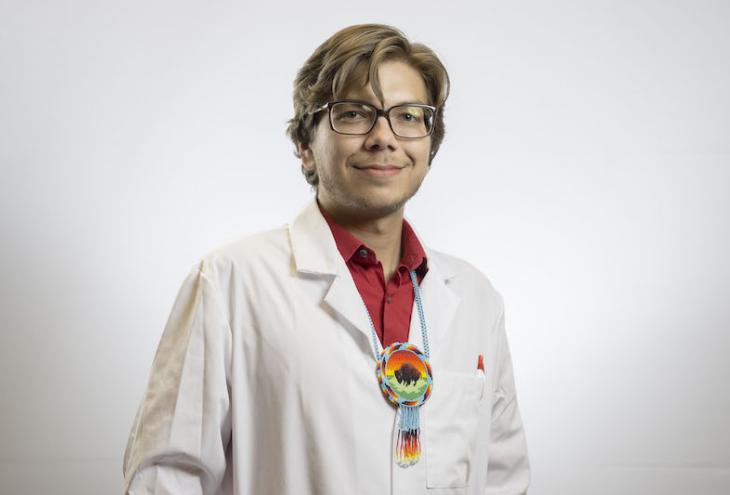When Steven Just takes stock of his high school experience, he admits that because of some personal struggles, he did not achieve the highest grades or have the best attendance. In fact, sometimes he clashed with the principal and teachers. But the advice he gives today — even to students who aren’t enjoying high school — is apply to college. “College is so different from high school,” he points out, “and you can choose to study subjects that you find interesting.”
Just says his biggest challenge in getting into college was explaining his not-so-great high school record. But as a prospective first-generation college student, he was able to describe how college could change his life for the better. Once he was accepted into the University of Minnesota Morris — a good distance from his hometown of Sisseton, S.D. — the next obstacle was how to pay for it. Even with a Pell Grant, a scholarship, and a tuition waiver, he still had a bill to pay every semester, so he did accept some subsidized student loans.
Another big challenge for Just was studying effectively. Without good study habits from high school, he fell behind during freshman year, ending up on academic probation. “I made some changes my sophomore year to ensure I did not fail and was on a path to success,” he explains. “I developed study habits, which meant that I studied on campus at the library, even in the evenings after classes.” Those habits were especially important as he tackled challenging courses as a chemistry major, and they continue to serve him well as he completes his final year on a PharmD track at the University of Minnesota Twin Cities.
He also joined supportive student groups, and Just says the one that helped him the most was the AISES College Chapter. Getting involved marked a big change for him, because even though he was invited to join the chapter his first year, Just declined. In his second year, he decided to attend a meeting, and there he met likeminded American Indian students who became his friends and support network. “I started out as a student member and then became the chapter co-chair,” he says. “In pharmacy school, at the University of Minnesota Duluth, I served as president of a different chapter. At the 2017 National Conference, I was elected National Student Representative for a two-year term. I plan to stay involved with AISES as a professional member after I graduate in 2020 with my PharmD degree.”
“[Discovering summer research opportunities was] life-changing. It opened my eyes to the world of biomedical research, academia, health care, and professional traveling and networking at conferences.”
In another important change in his undergrad routine, Just began going to his professors’ office hours and even ventured to schedule meetings outside those posted times. This step was important because the professors answered Just’s questions and helped him understand the course material. The interactions were so helpful, in fact, that he became a regular, stopping by the offices to say hello when he didn’t have questions.
To free more time for studying, he quit his part-time job at a local grocery store and focused on campus work-study jobs limited to 10 hours per week. He started working at the library, and eventually became a teaching assistant for the chemistry department.
As a first-generation student who didn’t get much advice during high school, Just had a lot to learn about academic opportunities. But he accepted the challenge and started to do new things, like ask for letters of recommendation, write letters of intent, travel on airplanes, and participate in research opportunities. “After I got out of my comfort zone a few times, I was able to talk with professors and new mentors about future career goals,” he says.
Among the opportunities he discovered were summer research experiences, and as an undergrad he was able to participate in three different ones. “They were life-changing,” he says. “It opened my eyes to the world of biomedical research, academia, health care, and professional traveling and networking at conferences.”
Just also took some elective courses that turned out to be pivotal. “I took an upper-level history course called American Indians and the U.S. Government,” he recalls. “This course was phenomenal in that I learned how to contextualize my life experiences as an American Indian with the historical policies that took place centuries and decades before I was born. I find this helpful as I plan to practice pharmacy at an Indian Health Service (IHS) facility and have a long-term goal of improving health care policies for American Indians.”
Ultimately, Just says he would like to become a leader within the IHS or other agency focusing on American Indian–Alaska Native (AIAN) health issues and policies. In the short term, he plans to practice clinical pharmacy, most likely at an IHS facility. “I know there will be an opportunity for me to apply what I’ve learned from my varied experiences in the future in the areas of AIAN health policy,” he says.
For now, Just is concentrating on his studies and supporting other Native students. “My advice is to never give up and think big — have high hopes for yourself,” he says. “That may seem generic, but it’s true. There were times when it would have been easier for me to go back to my hometown and work at the supermarket. But I knew if I stuck with it, learned from my mistakes, and was not afraid to ask for help, I could make it.”













